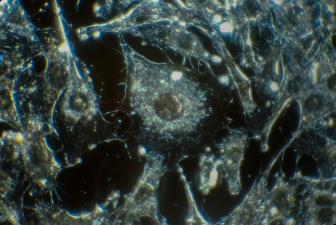Watch for the glimmer in his eyes: The story of Helene and her father
Last updated: 02 December 2024

You can legally access new medicines, even if they are not approved in your country.
Learn howIn this conversation, Helene reflects on the emotional and practical aspects of caring for a loved one with Alzheimer's disease. She shares her thoughts on the fear of developing Alzheimer's, how she and her husband have discussed what steps they would take if faced with the condition, and the importance of having open conversations with their children.
This deeply human story highlights the importance of being there for your loved ones even when they don’t recognize you anymore, and finding different ways to show them that they are surrounded with love.
-------
Everyone.org:
To start, could you tell us a little about your family’s experience with Alzheimer’s?
Helene:
Yes, of course. It was about 4 years ago when my father was diagnosed with Alzheimer's. We had already noticed for some time that he wasn’t fully understanding the world anymore. He absolutely refused to go to the doctor and denied it for a long time. Eventually, we took him to the doctor, and after some tests, it was clear that he had Alzheimer's. We didn’t go further with diagnosing the specific form of Alzheimer’s because he was already 83 years old, and we didn’t want to put him through more tests. He was already struggling, and we didn’t want to overwhelm him.
Everyone.org:
What was it like for your family after the diagnosis?
Helene:
After the diagnosis, we went back home. My mother was left with my father and it was quite tough. You think: “What now? How does this go on?” But my mother had a very strong drive to care for him for as long as she could, and she managed to do that for quite a long time.
Everyone.org:
How did the roles and responsibilities shift within your family?
Helene:
I am an only child, so I felt a strong responsibility towards both my parents. The primary care for my father was still with my mother, and I tried to support her as much as possible to ensure she was able to cope. It was a delicate balance because I didn’t want to push her to do something she wasn’t ready for. Eventually, the geriatrician confirmed that it was no longer possible for my father to stay at home, and we agreed to place him in a care facility. That was a hard decision, but it was for the best.
Everyone.org:
What were your strategies to ensure the well-being of the caregiver, your mother, was also taken care of?
Helene: Taking care of my father was a huge burden on my mother, and I helped her as much as I could, but it was a long journey of finding the right support systems. Luckily, I had help from my friend who could advise me on the various options available. In the end, having a case manager was helpful, though they primarily focused on the patient and not on the caregiver’s well-being.
Everyone.org:
Which healthcare professionals were involved in your father’s care?
Helene:
It started with our family doctor, but when my father’s condition worsened, a geriatrician was involved. He had started to show Parkinson-like symptoms due to the medication he was taking. The geriatrician helped adjust his treatment plan. After he moved to the care facility, the facility’s own doctors took over his care.
Everyone.org:
Did you feel your father received adequate care and medication? And was there room for discussing different treatment options?
Helene:
The geriatrician did discuss all the options available. We could try this or that, and each treatment option came with its own set of benefits and drawbacks. I think the discussions were open, but I didn’t look into other treatments outside of what was offered.
Everyone.org:
If that had been an option, would you have considered clinical trials or medication from abroad?
Helene:
I think we would have been open to exploring those options, especially to alleviate his mental distress. We weren’t looking to slow the progression of Alzheimer's or prolong his life, but if there had been something that could have improved his quality of life, we would have considered it.
Everyone.org:
What would have been important factors in deciding to pursue such treatment options?
Helene:
The clinical success of the treatment would have been key, as well as its results. But, of course, my father’s age played a role too. At his age, you wonder if it's worth pursuing aggressive treatments or if it’s better to focus on comfort.
Everyone.org:
How did your relationship with your father change as the disease progressed?
Helene:
It changed a lot. My father was once a very dominant figure, but over time, he became almost childlike. When he moved to the care facility, I was worried about how he would adjust, but oddly enough, he seemed to improve there. He didn’t have to pretend to be someone he wasn’t, and he could just be himself. It was nice to see him at peace, though the disease eventually progressed again, and things got much harder.
At some point, he didn’t recognize me anymore. And people would say “It must be very hard for you”. But strangely enough, you somehow adjust to it. You don’t expect it anymore. But I always noticed that when I visited, he knew I was someone he could trust. He would calm down, and his eyes would glimmer a little, so he did recognize me as someone safe. He just didn’t know whether I was a daughter, mother, or sister—he couldn’t place that anymore. But I was fine with that.
Everyone.org:
Has your understanding of Alzheimer’s changed over time?
Helene:
I’ve seen just how terrible the disease is, but my understanding hasn’t changed much. It’s a challenging disease, and the experience has been incredibly difficult, but I’ve learned a lot about care and coping through it all.
At the beginning, you try to understand it, so you can communicate better with someone with Alzheimer. But there’s no understanding it. You never know what’s going through their head.
One thing I learned is not to ask too many question to someone with Alzheimer’s. Just talk abou things, regardless of the topic. And sometimes as you do, you notice that something in them is triggered, and you learn over time to try and engage them in different ways.
Everyone.org:
Are you afraid of getting Alzheimer's yourself, and how do you deal with that fear?
Helene:
Yes, I do find it a scary prospect. It’s definitely a disease that seems to be becoming more common, perhaps because we know more about it now. And I do sometimes think, "What if it happens to me?" I’ve also thought about it a lot because I don’t want my children to have to take care of me if I end up like my father. But I’ve told myself, as long as I can still find joy and pleasure in life, it’s okay. But when my father reached a point where he was just angry all the time, I thought, "No, I don’t want that." I don’t want to live like that. So, my husband and I have talked about when it might be time for us to intervene. For me, as long as I can still enjoy the beautiful things in life, like a sunny day or something simple, then I’m okay. But if I become angry all the time and just scream, that’s when I wouldn’t want to continue.
Everyone.org:
How are you preparing for this possibility?
Helene:
Well, I’ve had some conversations with my husband about it, but I do tend to push the thought away. It’s not something you really want to think about happening to you. But at the same time, I realize it’s important to talk about it, because most people avoid it. It’s helpful, though, to have talked about it with my partner, so we both know how we feel about it. We’ve even talked to our children about it, so it’s become something we can discuss openly. I haven’t yet written anything down, though, like an official document or anything, but I do have a living will for my mother. If something were to happen to her and she couldn’t think rationally, I’m the one who will handle things for her, especially financial matters. In her living will, she’s made it clear that she doesn’t want to live a life without any hope, and I once asked her doctor if she would help with that. He said, "Not in the case of Alzheimer’s," and that really surprised me. I thought, "But that’s exactly when it’s needed the most." It made me realize that if my mother’s situation worsens like my father’s, I wouldn’t be able to count on this doctor to help her have a more comfortable life. That was very strange.
Everyone.org:
Many patients' families feel let down by pharmaceutical companies and the medication access system, as they have to wait for years to get medicines already available elsewhere. How do you view this issue?
Helene:
I think that’s very hard to understand, that a law or something can prevent you from getting medication that might actually extend your life or give you a better chance of survival. It’s frustrating to think that something is available, but you can’t get it when you need it most. I think it’s really good that organizations like Everyone.org exist, to help with that, because you can’t figure everything out on your own. It’s hard for one person to know everything available.
Everyone.org:
Looking back, is there anything you would have done differently?
Helene:
Well, my mother didn’t want to force my father to go to the doctor, even though I thought we should have. She didn’t want to take him there under false pretenses. But now I sometimes think that maybe we should have done things differently. Maybe we should have insisted on getting him help earlier, even if he didn’t want to go. But when someone really doesn’t want it, there’s not much you can do.
Everyone.org:
Do you have any advice for families facing an Alzheimer’s diagnosis? Is there anything you wish you had known earlier?
Helene:
Yes, I think it’s important to talk to a case manager or a caregiver consultant to understand what you’re up against and how to prepare for it. That’s really essential. It’s all about staying a step ahead, because if you don’t, you end up in a crisis situation. Then your loved one might end up in a place or situation that you didn’t want for them, and that’s not ideal. So it’s important to have many conversations with people who know the paths to take. I’d recommend starting with your GP, as they can help guide you, and in our case, the doctor also referred us to a case manager.
-----
If you or a loved one are dealing with an Alzheimer’s diagnosis, you are not alone. Draw insights, experiences, and solace, from others’ stories.
And if you need help finding out about participating in clinical research on Alzheimer’s, or getting access to Alzheimer’s medicines unavailable in your country, get in touch with Team Everyone. We’re here to help.




